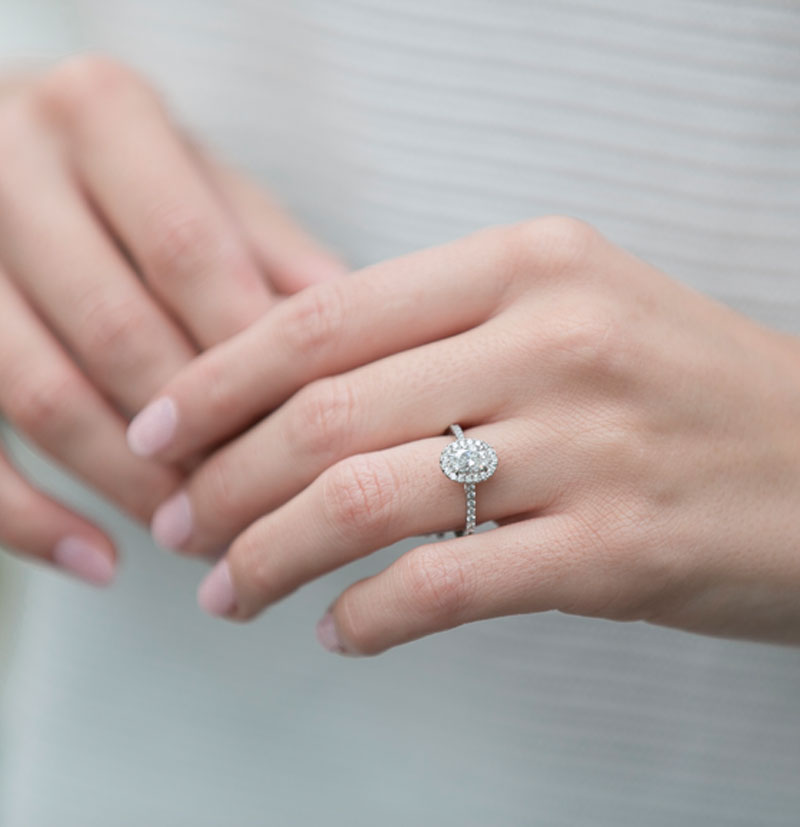BUYING GOLD AND PLATINUM
Jewellers throughout the ages have selected gold and platinum as their precious metals of choice because of their softness, natural beauty, resistance to tarnish and ease of workmanship.

Pure Gold
24-carat gold is this metal in its purest form. It is seldom used in making diamond jewellery as it lacks the high polished look and durability that we expect from our diamond jewellery. Various alloys are added to the pure gold to create different beautiful shades. The carat system used by jewellers refers to the quantity of pure gold in the mixture. For example, 18-carat gold is18 parts pure gold to 6 parts alloy and 9-carat gold is 9 parts pure gold to 15 parts alloy.
Yellow Gold
This is gold in its natural shade. It is by far the most common type of gold used in diamond jewellery. Yellow gold used for diamond jewellery is usually alloyed with copper and silver to strengthen it. How yellow a piece is will depend on its gold content. Generally, 18-carat gold has a deeper yellow than 9-carat gold, and so on.
White Gold
White gold has become very fashionable in recent years, as many consumers have opted for the cool, contemporary white look over the classic yellow look. White gold has the same properties as yellow gold, but is mixed with different alloys to give it its white colour. Usually, white gold is plated with an even whiter metal, called rhodium (a rare member of the platinum family) to enhance its appearance.
Platinum
Platinum is generally 95% pure (18 carat gold is 75% pure), platinum diamond jewellery does not fade or tarnish. Platinum’s purity makes it hypoallergenic and ideal for those with sensitive skin. Platinum is rare, the coveted treasure of discerning individuals. There is very little platinum on this earth and it is found in very few places around the world. This exquisite metal is 35 times rarer than gold. Platinum’s rarity makes it exclusive and distinctive - a celebration of your individuality.
Sterling Silver
Silver is a soft precious metal and should be treated with care. Your silver jewellery should be cleaned regularly. It is mandatory for Silver items to be hallmarked above 7.78 grams.
Hallmarking
The history of hallmarking in the UK dates back over 700 years to a Statute instituted by Edward 1. Its purpose then was the same as it is today – to protect the public against fraud and the trader from unfair competition. It is, in fact, the earliest form of consumer protection.
Hallmarking is necessary because when jewellery and silverware are manufactured, precious metals are not used in their pure form, as they are too soft.
Gold, Silver, and Platinum are always alloyed with copper or other metals to create an alloy that is more suitable to the requirements of the jeweller. Such an alloy needs to be strong, workable, yet still attractive.The precious metal must be mixed with other elements to give it the necessary properties such as flexibility to produce a desirable and durable article.
Even the most experienced jeweller or chemist cannot tell how much precious metal there is in an alloy, just by looking at it, nor whether a thick plating of gold is covering a base metal interior. Due to the high price of precious metals, this offers a huge opportunity for fraud and there has therefore always been a need to protect the public, and honest suppliers, from those who are tempted to cheat them.
Therefore all items being sold as gold, silver or platinum in the UK must be hallmarked to confirm that they meet the legal standard. This cannot be done by the manufacturer or importer; goods must be submitted to one of the four UK Assay Offices, or an Assay Office belonging to the International Convention.
The UK Hallmarking system has offered valuable protection for over 700 years. Compulsory Hallmarking protects all parties; the public who receive a guarantee of quality, the manufacturer who is given quality control and protection from dishonest competitors at a very low cost, and the retailer who avoids the near impossible task of checking standards on all his goods.
You can see the Assay Assured dealers notice here.















